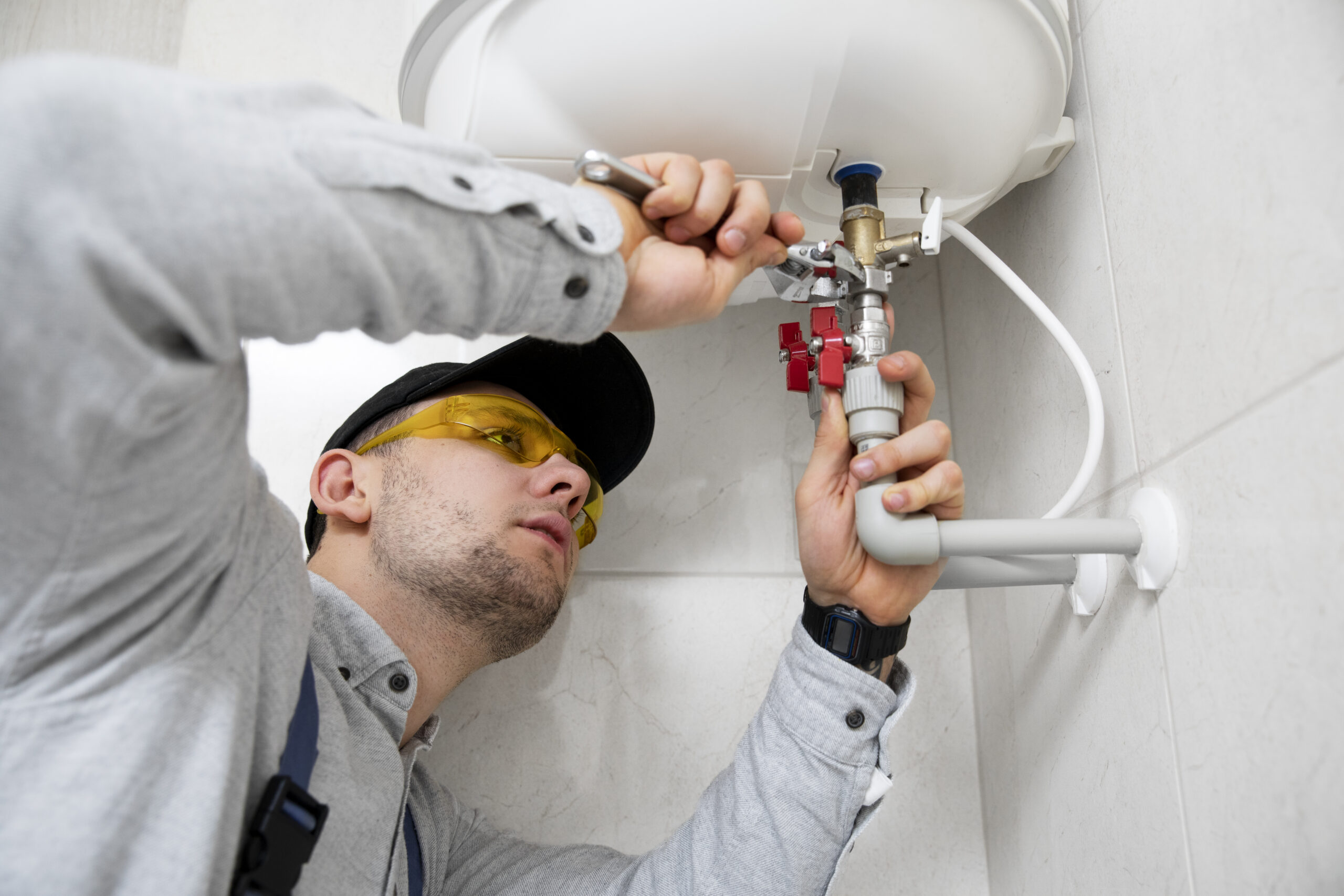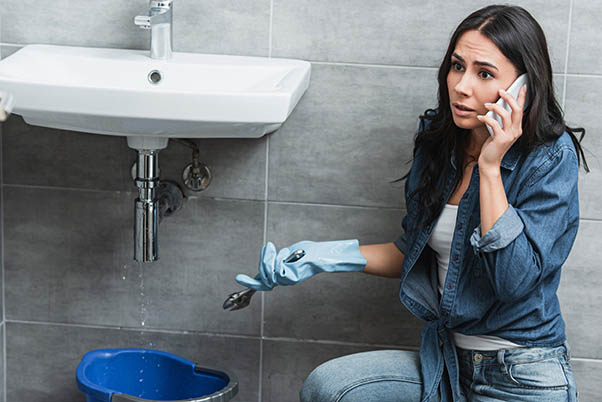Critical Plumbing Solutions: Actions to Follow Until A Plumber Arrives
Critical Plumbing Solutions: Actions to Follow Until A Plumber Arrives
Blog Article
What are your thoughts regarding Expert Tips for Managing a Plumbing Emergency Until Help Arrives?

Plumbing emergencies can strike at any time, causing tension and prospective damages to your home. Whether it's a ruptured pipe, a blocked drainpipe, or a dripping tap, knowing how to manage the situation until an expert plumbing technician arrives can save you from further complications. This write-up gives vital emergency situation plumbing suggestions to help you mitigate damage and restore control during a plumbing situation.
Switch off the Water
The first step in any pipes emergency situation is to shut down the water system. For local problems, such as a dripping tap or bathroom, switch off the valve near the fixture. When it comes to a major leak or burst pipe, find your home's primary water shut-off shutoff and turn it off right away. Knowing the area of these valves beforehand can save useful time during an emergency situation.
Turn off Your Hot Water Heater
In particular emergencies, such as a burst pipeline, it's smart to shut off your hot water heater. This protects against getting too hot or damage to the unit when water quits moving. Switch off the power supply to the water heater (electrical or gas) and allow it cool down to prevent potential threats.
Briefly Stop a Ruptured Pipe
A ruptured pipeline can cause significant water damages in minutes. To minimize the problem:
Call a specialist plumber promptly to address the problem permanently.
Have an Emergency Situation Pipes Kit
Prepare a fundamental pipes emergency situation package to deal with small concerns properly. Your package ought to include:
Having these devices accessible can make a significant difference in your capability to handle emergency situations.
Unclog Drains Pipes Safely.
A blocked drainpipe can be a discouraging and messy concern. Below's just how to tackle it:.
If these techniques don't work, avoid using extreme force, as it may intensify the clog.
Handle Overflowing Toilets.
An overruning bathroom can cause immediate disorder. Here's what you must do:.
Address Little Leakages with Momentary Solutions.
Little leakages can rapidly come to be considerable troubles if left unattended. Make use of these short-term solutions until specialist help shows up:.
While these fixes aren't long-term, they can aid minimize water loss and damages.
Take Care Of Frozen Pipeline Very Carefully.
In colder climates, frozen pipes are an usual emergency situation. If you think an icy pipeline:.
Know When to Call a Professional.
While quick fixes can assist temporarily, certain plumbing problems need prompt specialist attention. Call a plumbing technician if:.
Quickly calling an expert makes sure the problem is dealt with correctly and avoids further problems.
Avoid Further Damage.
Taking quick action to lessen damages can conserve you money and time in the long run. Here's just how:.
Final thought.
Plumbing emergencies can be overwhelming, yet with the right knowledge and devices, you can take care of the scenario properly up until assistance gets here. By switching off the water supply, resolving tiny leaks, and using short-lived repairs, you can minimize damages and maintain your home safe. Keep in mind, these tips are short-lived options; constantly get in touch with a certified plumber to take care of the source of the problem. Prep work and quick reasoning are your ideal allies in any pipes emergency.
8 Helpful Tips for Managing Plumbing Emergencies at Home
If your plumbing system hasn’t failed once, wait for it because almost everyone has a story to tell. Sometimes, it could be simple emergencies such as a leaking pipe, a blocked cistern, or even a big burst pipe. In situations like this, you need to have some handy tips to save you some money and from possible damages.
Take care of minor issues early.
Sometimes, you could have avoided an emergency by taking proactive measures while it was still early. Some major plumbing emergencies can be a result of an ignored minor issue. We recommend that you have items like plumbing tapes and other related items. A plumbing tape can allow you to manage minor leaks before the plumber arrives.
Cut off the water supply.
This tip is essential in almost any type of leakage problem. For problems like minor leakages in the toilet or kitchen, turn off the supply that takes water to the affected pipes. If the leakage is a major pipe, you must shut off the supply valve to the entire building. This will help you avoid flooding your home and neighbors if you share a flat.
Know your plumbing system
Folks typically move into a new apartment without understanding the water supply around the building. This can prove disastrous if a water emergency arises and the plumber is far away. The previous tip will prove useless if you don’t practice this one. More importantly, know where your water shut-off valve is located – you’ll need that knowledge to prevent potential home floods.
Have some common handy tools
There are lots of plumbing emergencies that you can handle without hiring a plumber. That’s why you must keep some tools available always. Some tools that you can use to fix simple plumbing emergencies easily include plumbing tapes, screwdrivers, thread seal tapes, plungers, pliers, tape measures, and rubber gloves.
Insulate your pipes from cold
You’ll save yourself from many plumbing expenses if you protect your water pipes from the cold. This is because of the harmful effects that cold weather can have on your pipes. During winter, your pipes can burst from being overly expected to freezing temperatures. So, make sure insulators are there to keep the pipes working correctly.
Avoid practices that will clog your toilet.
Many people indulge in practices that can damage the plumbing system of the entire building. One of these is when they use their toilet to dispose-off garbage. They flush all kinds of things, such as paper towels, bandages, hairs, female sanitary products, etc., down the toilet. This will block your toilet in the long run, incurring unnecessary expenditures. Dump such waste in the trash instead.
Check your dials regularly.
Sometimes, there could be leakages in your home without noticing them in time. So, constantly monitor your water meter dial. If the dial is reading when there is nobody using water, this is an indicator that there is leaking. Check for leaks immediately. Call a plumber as soon as possible if you can’t find any.
https://www.constructionplacements.com/8-helpful-tips-for-managing-plumbing-emergencies-at-home/

As a keen person who reads on Plumbing Emergencies: Tips on What To Do Before, I thought sharing that excerpt was worthwhile. For those who liked our blog post kindly make sure you remember to pass it around. We thank you for your readership.
Quote & Schedule Report this page